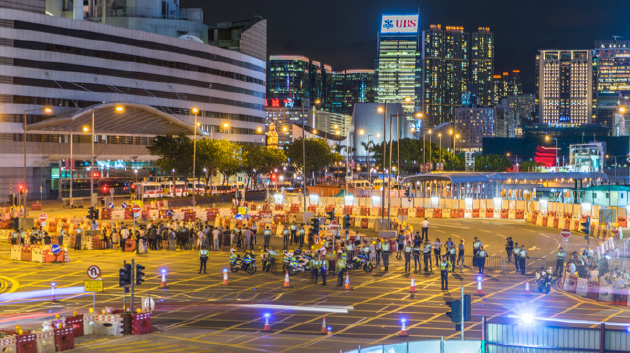Xi Jinping Takes Over Hong Kong
China From the Inside
One night before Xi Jinping’s visit to Hong Kong, protestors gathered at the Golden Bauhinia Square and the police blocked the road in case more come to support.
(Photo:YE HANZHANG / Shutterstock.com)
Zhongnanhai is central to China’s politics, and reading into the power shifts can give insight into the future of world politics.
China specialist Masaru Souma reports on the situation in and amongst China’s leaders.

Masaru Souma
Masaru Soma was born in 1956 in Aomori Prefecture. After graduating with a degree in Chinese from Tokyo Foreign Studies University, he joined Sankei Newspaper, where he held positions including head of the Hong Kong branch and assistant director of the foreign news desk. As a Nieman fellow he spent 1998-1999 at Harvard University. He left Sankei Shimbun in 2010, and currently works as a journalist. He has published many books including “Chugoku Kyosanto Ni Kesareta Hitobito” (The People Who Disappeared From the Chinese Communist Party) and “Xi Jinping No Shotai” (The Real Xi Jinping), which he wrote under the pseudonym Kayasawa Izuru. Soma also wrote “Shin Kotei – Hu Jintao No Shotai” (The New Emperor – The Real Hu Jintao) – all published by Shogakukan.
I visited Hong Kong on 1 July, the 20th anniversary of its handover from British occupation.
Chairman of China, Xi Jinping was also in Hong Kong, so they had mobilized 11 thousand police officers for security. The security was especially tight as, the night before Xi’s arrival, a pro-democracy group invaded and momentarily occupied the public square adjacent to his scheduled hotel.
Multiple military helicopters constantly patrolled the sky above guard ships patrolled Victoria Harbor, probably for anti-terrorism purposes.
Why the Soldier Parade Was Live Broadcast
“We will not tolerate any challenges against the central authority,” Xi declared at the celebration held on the 1st. To restrain the independence movement, he reiterated that, “destructive and infiltration activities against Mainland China via Hong Kong is crossing the red line, and will not be tolerated”.
The demand for democratization in Hong Kong is increasing daily, and some even seek independence. Xi’s speech and his call to increase Beijing’s power to intervene on Hong Kong reflected the Beijing central authority’s true anxiety.
Additionally, Xi went around on a military jeep to visit the 3100 People’s Liberation Army soldiers stationed in Hong Kong for a parade. This was live broadcast on television, to threaten the Hong Kong people and hint at them what could happen if they crossed the line.
Until now, former Secretary Generals such as Hu Jintao and Jiang Zemin had kept the existence of the stationed army low-key to avoid stimulating the Hong Kong people. Xi, however, strategically decided to use it to imply that Hong Kong is Chinese territory.
60% of Listed Hong Kong Companies Are Chinese
“Already, just 20 years after the handover, Hong Kong is being swallowed by China,” a Hong Kong diplomat said. “You can see this best in the fact that China has taken control over the Hong Kong economy”.
For example, Chinese companies listed on the stock exchange in 1997 numbered a mere 83, while by May this year this had grown to 1018 (63% of all companies). In comparison, companies owned by Hong Kong citizens make up just 30%. Of the listed companies, 9 of the top 10 companies in market capitalization are Chinese.
There has also been a sharp increase in China-related financial institutions appearing in Hong Kong Central District. Of the companies that signed a lease agreement in the Central District this year, Chinese companies contracted 52% of the total floor space, and Euro-American companies are being pressured out of the area.
China’s influences spread to the tourism industry: a high contributing factor to the economy. In 1997 the number of tourists visiting from Mainland China that year was 2.36 million. Last year, same study showed an imposing 42.8 million.
The Hong Kong economy has reached a stage where it can no longer function without China. “The Hong Kong economy has been taken over by China: we call this the ‘red dye’ effect,” my Hong Kong-born friend bemoaned.
An Important Chinese Military Base
Hong Kong is also turning into an important military base for China.
In June, the Chinese Navy launched a Type 055 destroyer that can handle cruise missile with a 540km range. They plan to put it in action early next year, and Hong Kong has been nominated as its primary base, our diplomatic inside source explained.
The destroyer has a displacement of 10,000 tons, is 180m long and is equipped with the latest technology in stealth and sonar functions. Not only is it the most powerful frigate in the Chinese Navy, it is the strongest ship built in Asia since WWII.
China has already succeeded in launching a DF-26 ballistic missile designed to target U.S. aircraft carriers. Its 3500km range includes Guam, and thus has the U.S. under lock and key. It is an aircraft killer and a Guam killer that will prevent the U.S. from mobilizing in emergency situations in the South or East China Sea.
Without the U.S. aircraft carriers everything will have to depend on warships, but the U.S. ballistic missile range of 125km will be up against the Chinese 055 with 4 times the range. It is obvious which is at an advantage.
While the world is distracted by the North Korean missile problem, China has used the opportunity to expand its control of the seas. It is not only through the economy that China is taking possession over Hong Kong, but also through the military.
A key player in improving the situation would be Japan. But if they fail to strengthen their defense, the Okinawan and Senkaku Islands will be attacked by China, and may even end up being invaded.



















